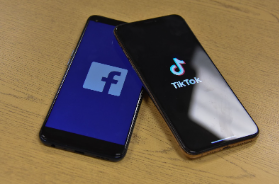How do Different Generations View Social Media?

TikTok and Facebook are one of the most popular social media apps among younger and older generations.
September 29, 2022
According to a global review by Datareportal in July 2022, 4.7 billion people spend over two hours on social media each day. With individuals stuck at home during the Covid pandemic, many relied upon social media to pass time and connect with those they missed.
Which social media apps are most popular? Do different generations of users have digital preferences?
To answer that question, the Howl worked to identify generational gaps. Among those generations, we chose to focus on Generations X, Z, and Alpha. Gen X includes those who were born between 1965-1980, Gen Z identifies those born between 1995-2009, and Gen Alpha represents those born between 2010-2024.
Our recent Day Creek Howl poll revealed which social media platforms those on campus used most:
YouTube (39%, 52 Votes)
TikTok (35%, 47 Votes)
Other (13%, 17 Votes)
Instagram (7%, 9 Votes)
Snapchat (3%, 4 Votes)
Twitter (2%, 3 Votes)
Facebook (1%, 2 Votes)
To start, we have to define the term ‘social media.’ According to Oxford Languages, social media are “websites and applications that enable users to create and share content or to participate in social networking.” While some may define this type of content strictly within the second part of Oxford’s definition, any type of consumed content for the singular user appears to fit.
When asked if YouTube is considered social media, the consensus on campus was a defining yes. “[YouTube is social media because] people can upload videos; it is entertaining,” says Giselle, a Gen Z seventh grader at Day Creek Intermediate.
According to our Howl poll, Youtube was voted #1 across campus. Tiktok, popular for its fifteen-second videos, came in as a close second.
“Tiktok has more funny videos than any other social media app that I’ve seen,” says Sifan, a Gen Alpha on campus.
In contrast, older generations mostly gravitate toward Facebook. The platform is valued for its “user-friendly” features which allow people to befriend others around the world.
It can also connect businesses to potential customers and is easy for consumers to enjoy community groups.
Though the majority of those interviewed do use social media, some (mostly in Gen Z and Alpha) don’t. They have little interest in having a platform or are not allowed to use it at all.
“I used to have social media, but not anymore because I’m too busy with schoolwork,” said Lavinia, a Gen Alpha student. “Social media is a plate of cookies. If you eat one you’re going to be like, ‘Oh it’s so good,’ and then you try to eat another one, and by the time you think that you are just eating one, you ate the whole plate. If you look at one post, you want to look at more. Then, it’s been like three hours and you’ve already wasted so much time,” Lavinia, a Gen Alpha student said.
Adults on campus voiced a similar concern. Some choose to avoid social media because it can be distracting.
“My favorite social media app is none because I find that I get pulled into it instead of doing things that I know will develop me as a human being,” said Mrs. Porter, a 7th-grade teacher.
Social media can also make it difficult to concentrate on work and distract users from their responsibilities, but it does have some benefits. Some apps provide easy communication access and entertainment and allow people to share news and ideas.
“[TikTok is] kind of my way to unwind and just catch up on what’s happening in the world,” said Ms. Bailey, a seventh-grade teacher.
Though social media is stigmatized for sidetracking teens and adults from doing things that may be more meaningful, the distraction can help people relax and recharge at the end of a tough day.
“It takes my mind off of things that might stress me out like school or parents because it distracts me and makes me feel an emotion I might not feel anywhere else,” said Parna F.





